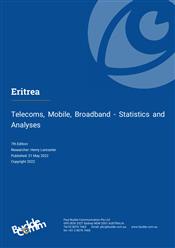Eritrea Telecoms Market Report
Telecoms, Mobile and Broadband - Statistics and Analyses

Eritrea’s conflict in Tigray is again detrimental to telecoms
Eritrea’s telecom sector operates under a state-owned monopoly for fixed and mobile services. Partly as a result of such restrictions on competition, the country has the least developed telecommunications market in Africa. Mobile penetration stands at only about 20%, while fixed-line internet use barely registers. This is exacerbated by the very low use of computers, with only about 4% of households having a computer, and most of these being in the capital, Asmara
Although the provision of internet services is open to competition, about 2% of households have access to the internet. As a result, such growth as there is in the mobile and mobile internet sectors. The national telco, the Eritrean Telecommunication Services Corporation (EriTel), continues to roll out a 3G network which provides basic internet access to the majority or Eritreans.
Considerable investment in telecom infrastructure is still required to improve the quality of services. The government has embarked on a work program to do exactly that, specifically aimed at extending services to remote areas, improving the quality of services, and ensuring that more telecoms infrastructure is supported by solar power to compensate for the poor state of the electricity network.
Additional foreign investment in telecom infrastructure, as well as introduction of more competition, would help transform what remains a virtually untapped market.
Key developments:
- Government continues with infrastructure developments;
- EriTel extends mobile coverage;
- Re-opening of border with Ethiopia threatened by renewed regional conflict;
- Report update includes recent market developments.
Companies mentioned in this report:
Eritrean Telecommunication Services Corporation (EriTel)
Related Reports
- Africa - Mobile Infrastructure and Mobile Broadband
- Africa - Mobile Network Operators and MVNOs
- Africa - Fixed Broadband Market - Statistics and Analyses
- Libya - Telecoms, Mobile and Broadband - Statistics and Analyses
- Lesotho - Telecoms, Mobile and Broadband - Statistics and Analyses
- Benin - Telecoms, Mobile and Broadband - Statistics and Analyses
- Burkina Faso - Telecoms, Mobile and Broadband - Statistics and Analyses
- South Africa - Telecoms, Mobile and Broadband - Statistics and Analyses
- Kenya - Telecoms, Mobile and Broadband - Statistics and Analyses
- Ghana - Telecoms, Mobile and Broadband - Statistics and Analyses
Share this Report
TMT Intelligence
A platform to scale your intelligence tasks
Monitor critical insights with our AI-powered Market Intelligence Platform gathering and analyzing intelligence in real time. With AI trained to spot emerging trends and detect new strategic opportunities, our clients use TMT Intelligence to accelerate their growth.
If you want to know more about it, please see:
Research Methodology
BuddeComm's strategic business reports contain a combination of both primary and secondary research statistics, analyses written by our senior analysts supported by a network of experts, industry contacts and researchers from around the world as well as our own scenario forecasts.
For more details, please see:
More than 4,000 customers from 140 countries utilise BuddeComm Research
Are you interested in BuddeComm's Custom Research Service?
Hot Topics
News & Views
Have the latest telecommunications industry news delivered to your inbox by subscribing to BuddeComm's weekly newsletter.